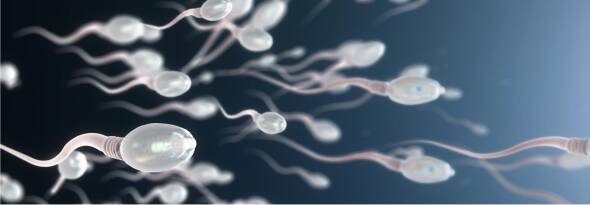Infertile men got a piece of good news earlier this month when researchers announced a new discovery: some men who had been diagnosed with infertility actually had normal, fertile sperm – in their testicles.
The research found that while the ejaculated sperm of these same, infertile men was not good quality, sperm taken from their testicles was similar to the ejaculated sperm of fertile men. The reason? Sperm undergoes DNA damage as it travels from the testicles to the urethra, and that damage can affect a man’s fertility. DNA damage was higher in the ejaculated sperm of infertile men compared with the ejaculated sperm of fertile men.
The announcement, made by UK-based scientists at a urology conference in Spain, was a significant development in the field of male infertility. But what does the discovery mean? How could it affect infertility treatment for men? And what’s next?
Reproductive Medicine Associates of New Jersey (RMANJ) urologist Dr. James Hotaling provides some insight into what the research means.
This study found that testicular sperm had less DNA damage than ejaculated sperm in the same group of infertile men. Is this a significant finding?
Dr. Hotaling: Other data showing similar findings has been presented in the past, but this is a larger study that confirms what many have suspected. Namely, that DNA fragmentation rates are significantly lower in testicular vs. ejaculated sperm.
This is significant in that it further reinforces the importance of treating male factor infertility and provides yet another actionable item to improve fertility – something that can come from an evaluation by a reproductive urologist.
Can you explain the concept of DNA damage in sperm, and how this damage can impact fertility?
Dr. Hotaling: The DNA in sperm is packaged very tightly in order to facilitate delivery of its content to the egg and help poise the embryo for embryogenesis in the first 10 weeks of life. Breaks in the DNA can interfere with this process.
The study links oxidative stress, which can be caused by a poor diet and smoking, with DNA damage in sperm. What exactly is oxidative stress?
Dr. Hotaling: Oxidative stress is caused by reactive oxygen species that lead to inflammation in the reproductive tract. This inflammation causes damage to the DNA as the sperm travel from the testicle out through the epididymis, vas deferens and into the urethra, where they come out through the penis. The level of inflammation is progressively increased during this journey.
How could these findings impact infertility treatment for men?
Dr. Hotaling: This study would indicate that DNA fragmentation abnormalities are found in 40% of infertile men compared to 15% of fertile men. This study would indicate that using testicular sperm for In Vitro Fertilization (IVF), even though sperm is present in the ejaculate, may be helpful in some men
with infertility and elevated levels of DNA fragmentation. If sperm is obtained directly from the testicle, IVF with Intracytoplasmic Sperm Injection (ICSI) is necessary, as the sperm has not learned fully how to swim yet.
How would doctors identify elevated levels of DNA fragmentation in infertile men?
Dr. Hotaling: There are several commercially available DNA fragmentation tests that look at DNA damage in sperm.
What types of additional studies are necessary to formalize the results of this study and change treatment protocols for this population?
Dr. Hotaling: Ideally, we would do a prospective randomized placebo controlled study to examine this and prove definitively that using testicular sperm is helpful in this patient population.
RMANJ is a worldwide leader in fertility science, committed to advancing the field one healthy baby at a time. To make an appointment with a fertility doctor, click here or call 973.656.2089.
